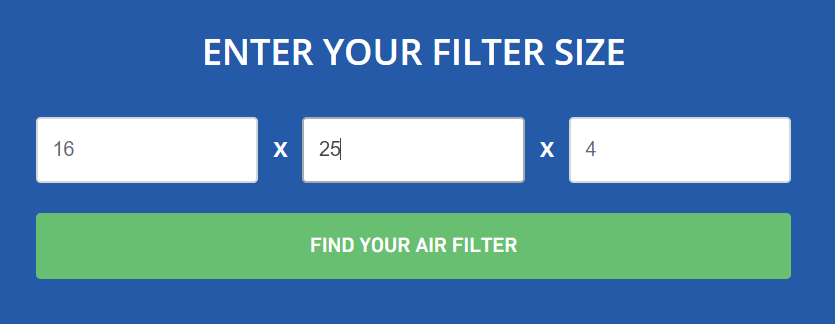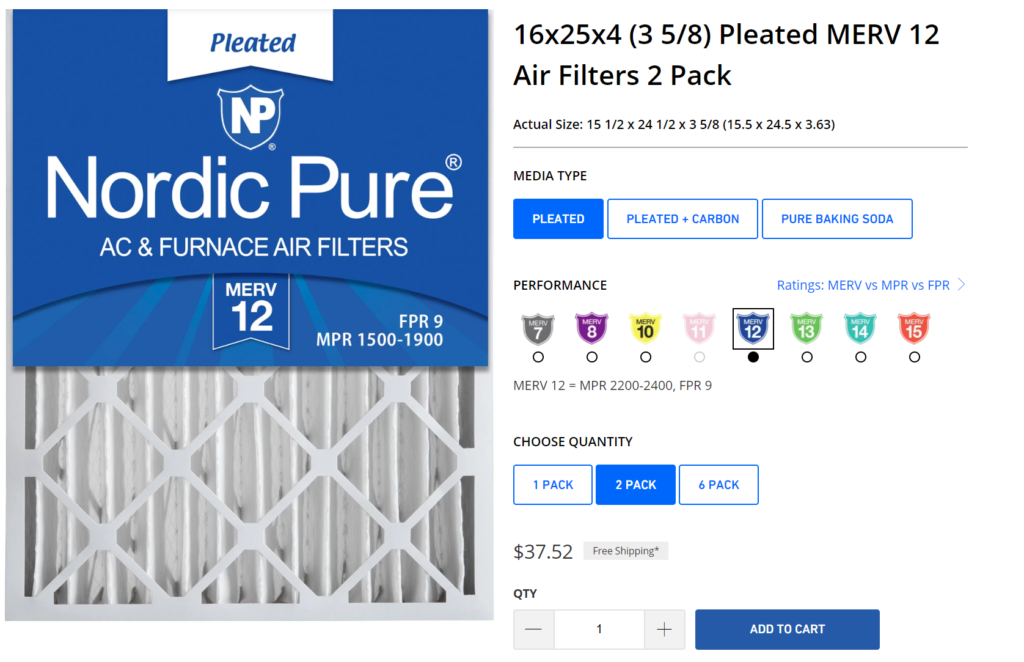Do you know how often you should change an air filter in your house? Most people don’t and it can be costly if you don’t perform this simple home maintenance on a regular basis.
Change out your filter too soon and you waste money on air filters. If you change it too late then you run the risk of adding ware and tare on your furnace.
Main point, it’s important to change your filter if you want your home to maintain high quality air!
HVAC systems can be quite tricky! So, what’s the right time frame?
Luckily for you, today’s article is all about finding the right amount of time to change out your air filter.

This post may contain affiliate links which pays a commission and supports this blog. Thank you for your support!
How often should home air filters be changed?
On average, your home’s air filter should be changed ever 90 days or about three months. Homes located in dirtier areas, such as with a lot of construction, might consider replacing air filters every 45 days.
You should be ok if you stick to the 90 day rule, but other factors might apply which load your filter faster or slower. Which of these apply to your situation?
- How frequent does your HVAC run? I constantly run my home’s HVAC system because it’s a great way to filter out dust and purify your home’s air. Constantly running the fan means the filter gets dirtier faster and needs to be replaced sooner.
- How many people and pets occupy the home? More people and animals mean more filth circulating your air. You may need to change your home’s air filter sooner if you have a lot of occupants.
- Do you have any Allergies? People who have stronger allergic reactions may consider changing an air filter sooner for allergy relief. You should consider buying a higher quality filter if you have allergies.
- Do you buy high quality air filters? Some people may feel the need to buy cheap quality air filters which requires a more frequent change out. Buying high quality air filters provides better filtration and allows you to change filters less frequently.
- How big is your home? Larger homes tend to require more flow through your air filter to cover the space.
Here’s how often you might need to change your filter, if you meet any of the above criteria.
| Condition | How often should you change your air filter? |
|---|---|
| Unoccupied Home | Every 6 – 12 months |
| Individual household | Every 3-6 months |
| Family household | Every 3 months |
| Household with single pet | Every 2-3 months |
| Allergy Sufferer | Every 1-2 months |
| Household with multiple pets | Monthly |
How do I know if my filter needs changing?
The simplest way to know if your air filter needs changing is to inspect the old air filter. It’s ok for an air filter to have a small coating of dust, but shouldn’t have dust caked onto it.
Here’s an example of a filter that didn’t get replaced for seven months. Next to it is a clean air filter for reference.
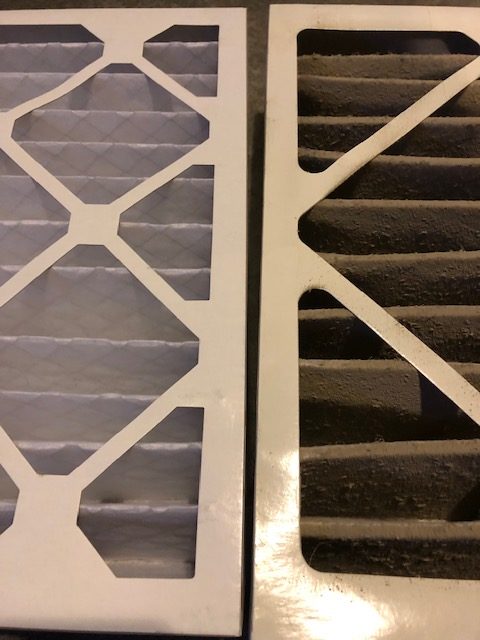
As you can see, seven months is way too long to wait between filter changes! Usually this home replaces their filters every 90 days. Try to not let the filter get as bad as the one in the picture above.
What are some other ways to find out if your furnace filter needs changing?
- Increased energy bills. A dirty filter might be the reason your energy bill is increasing. The fan has to work harder when your filter gets dirt which uses more energy.
- Longer heat time. Does it seem like your home takes longer to heat up? A dirty air filter prevents the flow of air which affects your furnaces ability to heat your house.
- Dirty home. If your home seems dirtier lately or you notice dust around the vents, it might be time to replace a filter. Your filter can’t filter anymore dust if it’s already clogged up.
- Increase in allergies. You may start to have more allergic reactions if you have allergies and a dirty air filter. Again, this is because your filter cannot filter anymore dust or pollen out of the air.
You can see the full list of dirty air filter symptoms. It may be time to change your filter if you experience any of these problems.
How often should you change your air filter in the winter time?
Generally, there is no reason to deviate from your 90 day filter change schedule during the winter time. You might inspect your homes furnace filter if you notice your pets shedding more often.
Some people find it useful to check their filters once every 30 days, but you don’t need to do so. Simply check your filter at regular intervals.
Need a reminder? Ask your phone to remind you to change an air filter every 90 days.
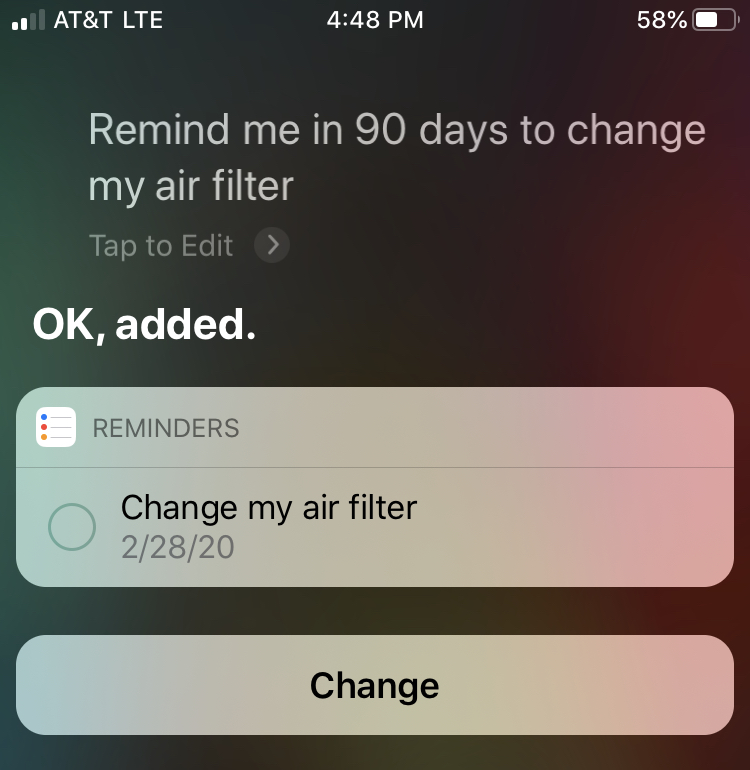
How do I change my homes air filter?
The first step to changing your homes air filter is to turn the system to off at the thermostat. Make sure the fan isn’t running and locate the filter housing on your HVAC unit. Usually, the filter housing is located with the main unit in the garage, but can be near the thermostat inside the house.

Remove the filter housing cover and the old filter. Pay attention to the flow direction arrow on the old filter so you know which way to place the new filter.
Not sure which way to insert the filter? Turn your furnaces fan back on and feel which way the air is flowing.
Next, insert the new air filter.
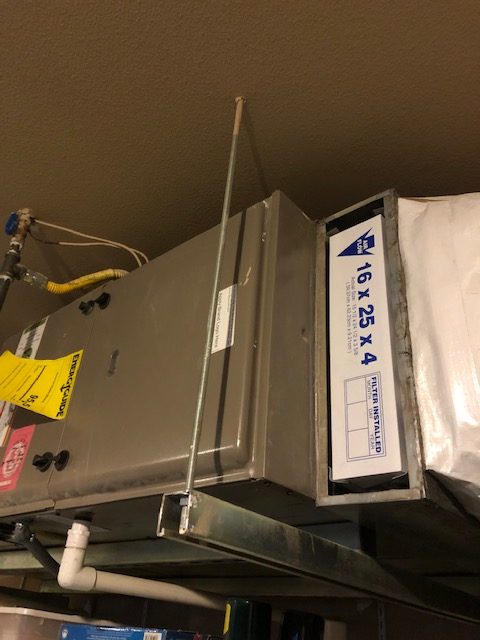
It’s recommended to write the date on your air filter. Doing so will help you keep track of your filter changes and how dirty they get during a specific time frame.

Finally, replace the cover to the filter housing! Set a reminder on your phone so you remember to change the filter again in 3 months.
How do you select a furnace filter?
You should be able to find your filter size by checking the old filter. The one pictured above is a 16″ x 25″ x 4″ which has an actual size of 15.5″ x 24.5″ x 3-5/8″.
Next, you’ll want to determine what MERV rating you should buy for your needs. MERV values for home use range from 1 to 13, where 13 is a higher filtration level.

I own pets, so a MERV 11 or higher is best for my situation. If you live in a large city or have allergies, a MERV 13 might be your best option.
Next, go to Nordic Pure. Enter in your filter size in the upper left corner of the website and search for your filter.
Confirm the actual filter size matches the actual size of your filter. If it does, select view details.
You’ll be brought to the Nordic Pure order screen where you should have a few options to choose from.
First select the filter media type. Pleated should be sufficient for most people. Pleated + Carbon and Pure Baking Soda are odor control options which come in handy if your home needs extra freshness.
Next, select your performance rating. Nordic Pure offers MERV 7 through Merv 15!
Note the price doesn’t change much between MERV 7 to MERV 12. However, the price jumps significantly the higher MERV rating at 13 and above. Therefore, I recommend sticking with a MERV 12 filter for performance and cost-effectiveness.
Finally, choose how many you want to purchase and hit add to cart.
What happens if you don’t change the air filter in your house?
You run the risk of damaging your HVAC if you don’t change the air filter in your house. The air filter will continue to trap dirt until it restricts air flow through your ventilation system. Your system then has to work harder which provides unnecessary ware and tare.
Eventually, dust will build up on moving parts such as the fan. Dust can cake onto the fan, restricting its movement and ultimately leading to failure.
You will start to see increased energy consumption as your HVAC system tries to keep up. Increased energy consumption means you’re going to pay more money in utility bills.
Higher MERV rated filters are designed to help keep mold and moisture from circulating your home. Pollen, dust, mold, and moisture are more likely to circulate freely throughout your home. The last thing you want is for a wide spread mold issue in your duct work.
Click to Tweet! Please Share!Click To TweetWhat does changing an air filter do?
Changing your air filter does make a difference in the quality of air you breath and in your utility bill. If you change your filter regularly, you can continually filter out dust, dander, pollen, mold, and moisture.
If air is free to flow, your system will experience improved system performance. In the long term, this will help you avoid ware and tare which results in costly air conditioner repair bills.
What happens if you run your furnace without an air filter?
Definitely not recommended! Running your furnace without an air filter is a quick way to ruin your HVAC system.
As mentioned before, dust will build up on the blower, causing ware and tare on the unit. Ultimately, this will lead to system failure and further potential problems such as spreading of mold.
Summary
It’s important to find the right air filter and replace it regularly, about once every 90 days. Changing your furnace filter regularly helps maintain energy bills, heat your home faster, prevent allergy attacks, and control house dust.
Select a new filter based on the MERV rating that is right for your family. MERV rating typically ranges from 1 to 13, where 13 provides a higher filtration.
Not changing your filter can significantly reduce the life of your furnace. So make sure to change it!
